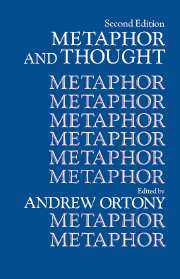Book contents
- Frontmatter
- Contents
- List of contributors
- Preface to the second edition
- Preface to the first edition
- 1 Metaphor, language, and thought
- METAPHOR AND MEANING
- METAPHOR AND REPRESENTATION
- 9 Generative metaphor: A perspective on problem-setting in social policy
- 10 The conduit metaphor: A case of frame conflict in our language about language
- 11 The contemporary theory of metaphor
- 12 Process and products in making sense of tropes
- 13 Metaphor, induction, and social policy: The convergence of macroscopic and microscopic views
- METAPHOR AND UNDERSTANDING
- METAPHOR AND SCIENCE
- METAPHOR AND EDUCATION
- References
- Author index
- Subject index
10 - The conduit metaphor: A case of frame conflict in our language about language
Published online by Cambridge University Press: 05 June 2012
- Frontmatter
- Contents
- List of contributors
- Preface to the second edition
- Preface to the first edition
- 1 Metaphor, language, and thought
- METAPHOR AND MEANING
- METAPHOR AND REPRESENTATION
- 9 Generative metaphor: A perspective on problem-setting in social policy
- 10 The conduit metaphor: A case of frame conflict in our language about language
- 11 The contemporary theory of metaphor
- 12 Process and products in making sense of tropes
- 13 Metaphor, induction, and social policy: The convergence of macroscopic and microscopic views
- METAPHOR AND UNDERSTANDING
- METAPHOR AND SCIENCE
- METAPHOR AND EDUCATION
- References
- Author index
- Subject index
Summary
I should like to respond to Professor Schön's chapter by replaying his theme several octaves lower. In my opinion, he has struck exactly the right set of notes. “Problem setting” should indeed be considered the crucial process, as opposed to “problem solving.” And the “stories that people tell about troublesome situations” do set up or “mediate” the problem. And “frame conflict” between various stories should be studied in detail, precisely because it is quite often “immune to resolution by appeal to the facts.” It is hard to think of a better overture to genuine advance in the social and behavioral sciences than this. At the same time, it seems to me that Schön has managed to sound these excellent notes only in their overtones, so that the fundamental frequency is barely to be heard – even though, to my ears at least, Schön's kind of thinking is real and long awaited music.
Quite simply, what I believe is missing is the application of Schön's wisdom – this paradigm-consciousness – to human communication itself. It may seem predictable that I, a linguist, would take such a position. But, if I do, it is hardly disciplinary narrow-mindedness that motivates me. In 1954, Norbert Wiener, one of the originators of information theory, and the “father of cybernetics,” stated quite flatly: “Society can only be understood through a study of the messages and communications facilities which belong to it” (Wiener, 1954, p. 16).
- Type
- Chapter
- Information
- Metaphor and Thought , pp. 164 - 201Publisher: Cambridge University PressPrint publication year: 1993
- 212
- Cited by

